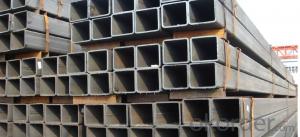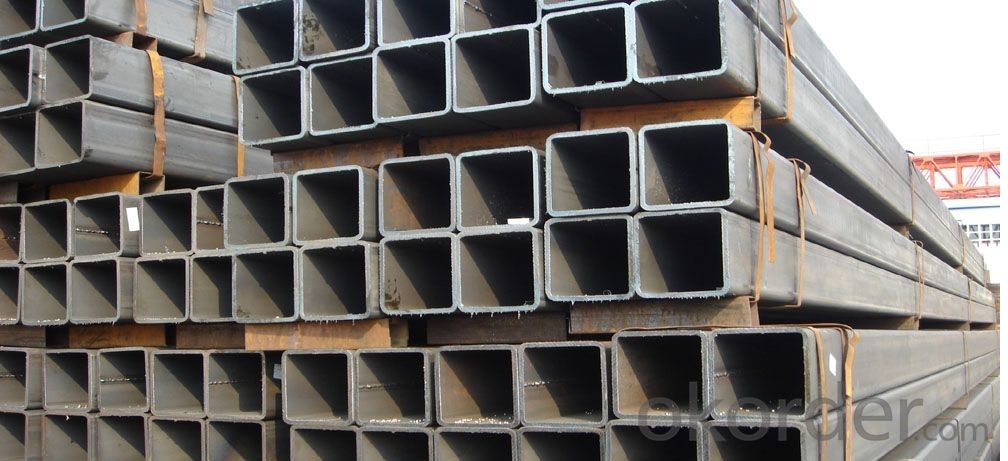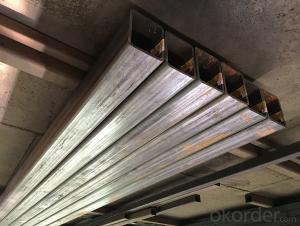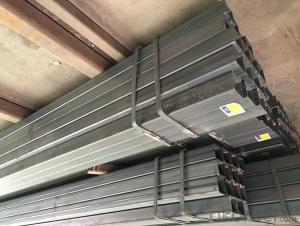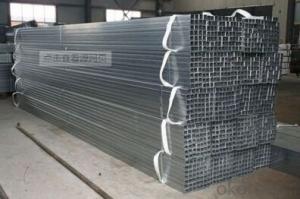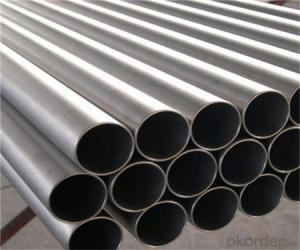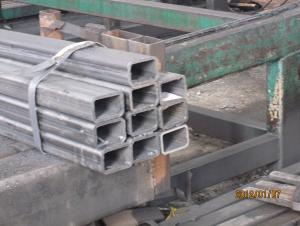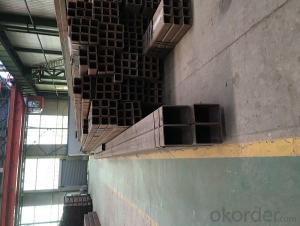Steel Pipe -- Rectangular Steel Tube Suppliers
- Loading Port:
- Tianjin
- Payment Terms:
- TT OR LC
- Min Order Qty:
- 25 m.t.
- Supply Capability:
- 9000 m.t./month
OKorder Service Pledge
OKorder Financial Service
You Might Also Like
1、Structure of Rectangular Steel Pipe API 5CT:
Rectangular Steel Tube is to be used for conveying gas, water, and petroleum foroil and natural gas industries. And used for structural steel pies purpose.We can provide you high quality production what you want and we sure we will give you price make you satisfied.
2、Main Features of Rectangular Steel Pipe API 5CT:
• High manufacturing accuracy
• High strength
• Small inertia resistance
• Strong heat dissipation ability
• Good visual effect
• Reasonable price
3、Rectangular Steel Pipe API 5CT: Specification:
Standard | GB, DIN, ASTM ASTM A106-2006, ASTM A53-2007 |
Grade | 10#-45#, 16Mn 10#, 20#, 45#, 16Mn |
Thickness | 8 - 33 mm |
Section Shape | Round |
Outer Diameter | 133 - 219 mm |
Place of Origin | Shandong, China (Mainland) |
Secondary Or Not | Non-secondary |
Application | Hydraulic Pipe |
Technique | Cold Drawn |
Certification | API |
Surface Treatment | factory state or painted black |
Special Pipe | API Pipe |
Alloy Or Not | Non-alloy |
Length | 5-12M |
Outer Diameter | 21.3-610mm |
Grade | 20#, 45#, Q345, API J55, API K55, API L80, API N80, API P110, A53B |
Standard | ASME, ASTM |
1) Material:20#(ASTM A 106/A53 GRB.API5LGRB,GB),45#,16Mn,10#.
2) Specification range:OD:21.3-610mm,WT:6-70mm,length:6-12m or according to the requirement of clients.
3) Excutive standards:GB,ASME API5L.ASTM A 106/A53,Despite of the above standards,we can also supply seamless steel pipe with standard of DIN,JIS,and so on,and also develop new products according to the requirements of our clients!
4) Surface:black lacquered,varnish coating or galvanized.
5) Ends:Beveled or square cut,plastic capped,painted.
6) Packing:bundles wrapped with strong steel strip,seaworthy packing.
4、Packaging & Delivery
Packaging Details: | seaworthy package,bundles wrapped with strong steel strip |
Delivery Detail: | 15-30days after received 30%TT |
5、FAQ of Rectangular Steel Pipe API 5CT:
①How is the quality of your products?
Our products are manufactured strictly according to national and internaional standard, and we take a test on every pipe before delivered out. If you want see our quality certifications and all kinds of testing report, please just ask us for it.
Guaranteed: If products’ quality don’t accord to discription as we give or the promise before you place order, we promise 100% refund.
②How about price?
Yes, we are factory and be able to give you lowest price below market one, and we have a policy that “ for saving time and absolutely honest business attitude, we quote as lowest as possible for any customer, and discount can be given according to quantity”,if you like bargain and factory price is not low enough as you think, just don’t waste your time.Please trust the quotation we would give you, it is professional one.
③Why should you chose us?
Chose happens because of quality, then price, We can give you both.Additionally, we can also offer professional products inquiry, products knowledge train(for agents), smooth goods delivery, exellent customer solution proposals.We sure will give you professional service and make you satisfied.
6、 Rectangular Steel Pipe API 5CT: Images:
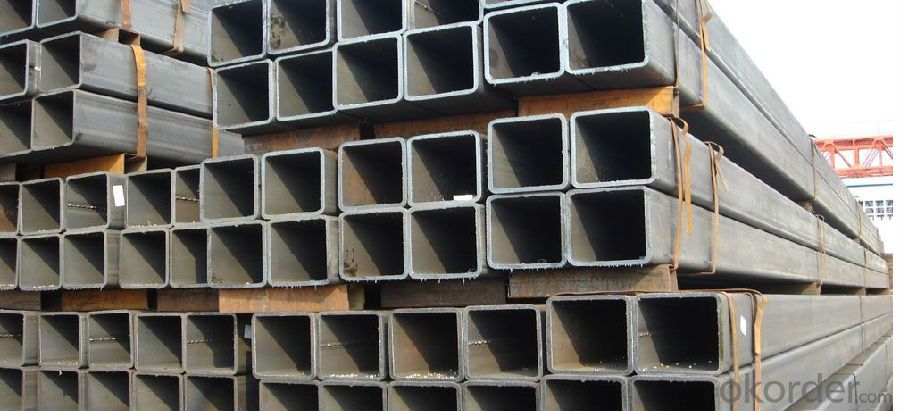
- Q: How do steel pipes perform in high-altitude applications?
- Steel pipes perform well in high-altitude applications due to their inherent strength and durability. The high tensile strength of steel allows it to withstand the harsh conditions and extreme temperature variations experienced at high altitudes. Furthermore, steel pipes are resistant to corrosion, making them suitable for use in high-altitude environments where exposure to moisture and atmospheric gases is common. Overall, steel pipes are a reliable choice for various high-altitude applications, including oil and gas transportation, construction, and infrastructure development.
- Q: How are steel pipes tested for strength and durability?
- Steel pipes are typically tested for strength and durability through various methods, including non-destructive testing techniques such as ultrasonic testing, magnetic particle inspection, and visual inspection. These tests help identify any potential defects, cracks, or flaws in the pipes. Additionally, destructive tests like tensile testing and impact testing are conducted to measure the strength and toughness of the steel pipes. These rigorous testing procedures ensure that the pipes meet the required standards and can withstand the intended applications.
- Q: SC15 what does galvanized steel pipe look like?
- Zinc plating: galvanized steel pipe hot galvanized and galvanized two kinds, hot galvanized, zinc coating thickness, with uniform coating, adhesion, long service life and so on. The cost of galvanizing is low, the surface is not very smooth, and the corrosion resistance of itself is much better than that of galvanized pipe. Refer to
- Q: Are steel pipes suitable for use in chemical plants?
- Yes, steel pipes are suitable for use in chemical plants. Steel pipes have excellent resistance to corrosion and high temperatures, making them ideal for transporting various chemicals and fluids in a safe and efficient manner. Their strength, durability, and versatility make them a preferred choice in the chemical industry.
- Q: Heating system DN40 and DN32 welded steel pipe how to connect?
- Is the wire: also called pipe thread connection, the malleable steel pipe fittings, malleable iron is the thread connection using DN40X32 diameter hoop.
- Q: How are steel pipes used in the construction of water supply systems?
- Steel pipes are commonly used in the construction of water supply systems due to their durability and strength. They are often used to transport water from the source to treatment plants, as well as for distribution to homes and businesses. Steel pipes are resistant to corrosion, which ensures the quality of the water and the longevity of the system. Additionally, their high pressure-bearing capacity makes them suitable for water supply networks that require efficient and reliable transportation of water.
- Q: How do steel pipes perform in earthquake-prone regions?
- Steel pipes perform well in earthquake-prone regions due to their high strength and ductility. They are capable of flexing and absorbing seismic energy, reducing the risk of catastrophic failure. Additionally, steel pipes can be designed with proper reinforcement to withstand ground movements, making them a reliable choice for infrastructure in earthquake-prone areas.
- Q: How are steel pipes protected against corrosion?
- Steel pipes are protected against corrosion through various methods such as coating them with corrosion-resistant materials like epoxy or zinc, cathodic protection using sacrificial anodes or impressed current systems, and maintaining a protective layer on the pipe's surface through regular maintenance and inspection.
- Q: How are steel pipes repaired if they are damaged?
- Steel pipes can be repaired if they are damaged by various methods such as welding, pipe lining, or using repair clamps. The chosen repair method depends on the extent and type of damage to the pipe.
- Q: How are steel pipes classified based on their thickness?
- There are three main categories for classifying steel pipes based on their thickness: Schedule, Nominal Pipe Size (NPS), and Wall Thickness. In North America, the Schedule classification is commonly used and refers to the pipe's wall thickness. It is indicated by numbers like Schedule 10, Schedule 40, and Schedule 80, where a higher number means a thicker pipe. On the other hand, the Nominal Pipe Size (NPS) classification is used internationally and refers to the pipe's inside diameter. It is expressed in inches and is usually followed by a schedule number to indicate the wall thickness. For example, NPS 6 Schedule 40 means a pipe with a 6-inch inside diameter and a wall thickness according to Schedule 40. Additionally, steel pipes can be classified based on their wall thickness in millimeters or inches. This classification provides a more precise measurement of the pipe's thickness and is commonly referred to as the "wall thickness" or "wt" in specifications. The wall thickness is measured from the outside diameter to the inside diameter and can be expressed in various units of measurement like millimeters, inches, or gauge. In summary, steel pipes are classified based on their thickness using different systems such as Schedule, Nominal Pipe Size (NPS), and Wall Thickness. These classifications ensure the selection of the appropriate pipe for specific applications, taking into account factors such as pressure requirements, structural integrity, and compatibility with other system components.
Send your message to us
Steel Pipe -- Rectangular Steel Tube Suppliers
- Loading Port:
- Tianjin
- Payment Terms:
- TT OR LC
- Min Order Qty:
- 25 m.t.
- Supply Capability:
- 9000 m.t./month
OKorder Service Pledge
OKorder Financial Service
Similar products
Hot products
Hot Searches
Related keywords
